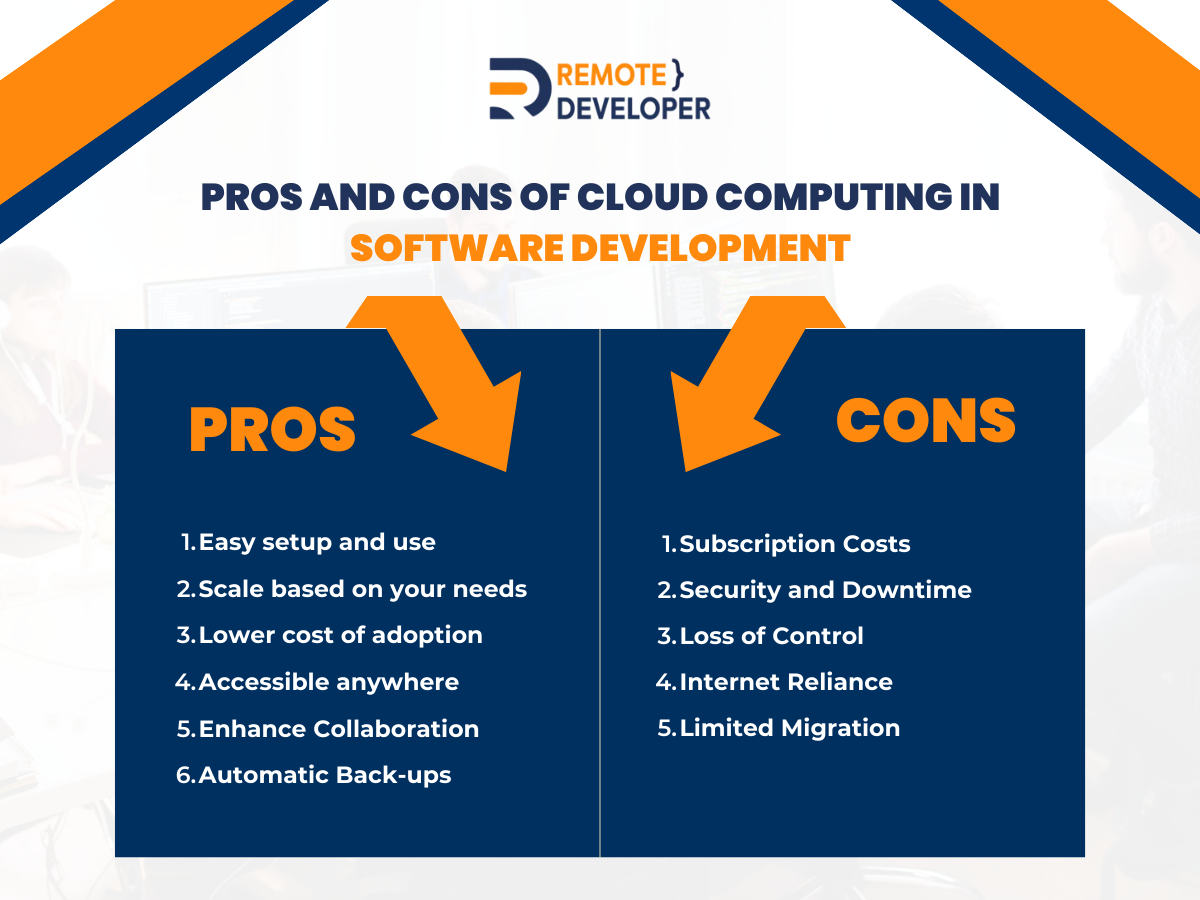Remarkable innovations like cloud computing in software development can provide many benefits. Naturally, this ignites a fast pace of advancement and market competition.
This also extends to your business. You can leverage cloud computing to your advantage in a lot of ways. The point is that it is an innovation that can make a big difference in your next software development project and, ultimately, your business.
So, before you jump in and invest in cloud computing for your business, there are a couple of things you need to weigh in first. Specifically, you need to know the pros and cons of cloud computing in software development. In this article, we are sharing the things you need to know to help you make a more informed decision and maximise it to its full potential.
What is Cloud Computing?
Basically, cloud computing is a new way to store large amounts of data via the Internet— think of Google Drive and Dropbox. This is achieved by storing it in a cluster of servers, which is in charge of handling data storage, management, and processing.
Because cloud computing employs a network of servers you can store a lot of things. This alone is considered a big plus already considering traditional hard drives, physical servers, and personal computers have limited storage—which also limits you and your work.
In the case of cloud computing in software development, this opens you up to a lot of opportunities. One of the most practical examples is that you do not have to worry about whether there is enough space on your computer when you are working on a new software project.
Service Models
There are three types of cloud computing services to choose from. Depending on your needs, requirements, and setup, they also grant varying degrees of control. Whichever you choose will influence the tech infrastructure of your organisation, so carefully consider your current setup now and later on.
- Infrastructure as a Service (IaaS). This gives you access to servers, storage, and networks, enabling you to run whichever software you choose.
- Platform as a Service (PaaS). With this option, you can access tech in the cloud that already has a specific operating system installed.
- Software as a Service (SaaS). This provides you with access to particular software and applications that are running on the cloud infrastructure.
Deployment Models
Aside from service models, there are also different types of cloud computing deployment models that give you options based on the needs and requirements of your business and software project.
- Private Cloud. This is a model that is deployed internally or externally and is best suited for just a single company or organisation.
- Community Cloud. This cloud infrastructure is a great option if there is more than one organisation with similar work requirements.
- Hybrid Cloud. This is a combination of the Private and Public cloud models. It essentially takes the best of both worlds to give you more flexibility.
- Public Cloud. This model is designed to provide simultaneous access for the general Internet audience or multiple users.
Pros and Cons of Cloud Computing in Software Development
There is no denying that cloud computing in software development will potentially give your business a boost. But before you make the jump, we compiled a list of things you need to consider first.
We also encourage you to check out other sources, like the pros and cons of cloud computing pdf or guide, to get a more diversified insight since cloud computing is a big investment for your business.

Pros
Easy Setup and Use
One of the notable pros of cloud computing in software development is usability. There is no complicated setup involved. You and your team can instantly get access. So long as you have a stable internet connection, you do not have to worry about your hardware’s capabilities.
Plus, since it uses a server structure, you save the hassle of implementation and other relevant details. In fact, a third-party provider will manage it for you.
Scale Based On Your Needs
Another big plus to incorporating cloud computing in software development is that you can easily scale certain aspects like how many people have access and processing power, depending on your needs.
This flexibility is a big deal since the requirements will change from one project to another. So, being able to scale at any time enables you to actually maximise your investment.
Lower Cost of Adoption
In relation to the scalable nature of cloud computing in software development, you can just pay for what you need. It is a pricing plan provided by most, if not all, cloud service providers.
On your end, it is budget-friendly. Since you do not need to buy more hardware or hire dedicated personnel, that means you can allocate some of your resources to your software project, operations, or other aspects of your business. For example, you have more budget to fill up positions like in-house software engineers and other highest-paying IT jobs.
Accessible Anywhere
One of the biggest pros of cloud computing in software development is its accessibility. Since it can be accessed so long as you have a stable internet connection and the hardware meets the minimum requirements.
Not only does this mean you and your team can work from home or anywhere you want. This also opens you up to the opportunity to further cut down costs while still delivering the same quality—like hiring a dedicated remote team.
Enhance Collaboration
So, regardless of whether you have an in-house team, an offshore team, or a combination of both, having access to the same resources makes it easier to collaborate in real-time as well.
Plus, another benefit to this is that everyone will always be on the same page and hold each other accountable.
Automatic Back-Ups
As mentioned earlier, cloud computing service providers handle everything that has to do with maintaining the servers used to store data. This means you and your team do not have to worry if your work is not being properly backed up.
Cons
Subscription Costs
Of course, there are also disadvantages of cloud computing in software development, particularly the cost. It is a more budget-friendly alternative to setting up your own server. However, the price of your subscription may also go up based on the needs of your team and your software project.
Security and Downtime
Another thing you should also consider about cloud computing in software development is the potential for security breaches and data leaks. So, make sure to choose a service provider that has a strong and secure platform to avoid this.
In addition, you should also consider downtime. Whether you like it or not, there will be a time when the cloud will physically fail because of an error or problem from the service provider’s end. While it does not happen quite often, it is something to factor in.
Loss of Control
Since services like cloud computing are provided by third-party companies, this means you do not have control with regard to storing your data, such as hardware, software, maintenance, and security.
But, what you have control over is which provider will you choose. Since you are placing your trust in another party, make sure to check if they suit your business and project needs.
Internet Reliance
Cloud computing in software development is a double-edged sword. On one hand, it can provide you flexibility and scalability since it is accessed via the Internet. On the other, since you will be reliant on a stable connection and good web performance, it can also be the reason for potential delays if your team members experience blackouts or connection loss.
A way to counter this is to make sure you have local backups of your data. This ensures that you and your software development team can continue working if you have slow bandwidth, spotty Internet connection, or experience a blackout.
Limited Migration
Choosing a cloud computing provider is a long-term commitment. So, if you decide to transfer your data to another provider, this will open you up to a lot of drawbacks.
One of these is data migration. Since you have a large amount of data, it will take a while for you to completely back them all up via the cloud—especially if you or your team members have a slow Internet connection.
In addition, you also expose yourself to more security breaches. If you are migrating your data from one platform to another, hackers and other parties have more chances to leverage weak security points during the move.
Conclusion
With that said, it is a big boon. Naturally, there are pros and cons of cloud service models.
Right at the top, some of the pros are that it provides you with flexibility, scalability, and accessibility. Aside from these, there are also trickle-down advantages as well like the opportunity to work from home, and even the potential to hire a dedicated remote team to help you with your software project.
Of course, there are also drawbacks that you need to weigh in. The most glaring of them all is the potential for security breaches and data leaks. Luckily, most of the cons listed above have workarounds to avoid them.
All in all, cloud services that are available right now can really help you in your software projects. Just make sure it fits your needs now and later on, that way you can maximise your investment.
Ready to learn more? Gain valuable IT and development insights for your projects. Read our articles now!

